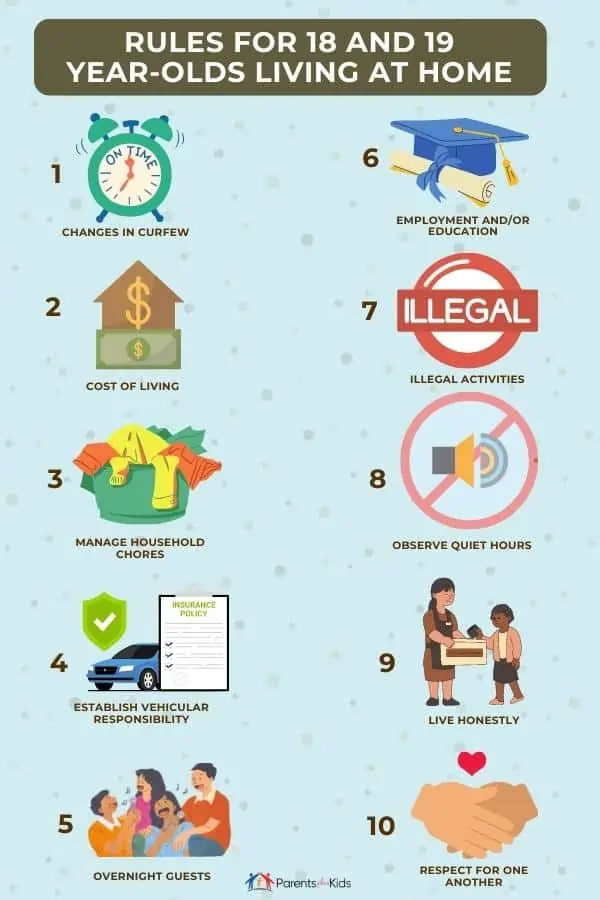10 House Rules For 18 and 19-Year-Olds Living at Home

This post may contain affiliate links. If you buy through the link, I may earn a commission. Learn More.
So your adult child is still living at home. This is not an uncommon situation though it does present an interesting predicament.
What kind of rules do you have for your child and how do you enforce them? Is it more important to give your child space and freedom or keep control?
*FYI, some of the links in this article about rules for 18 and 19-year-old living at home may be affiliate links. If you click and make a purchase, we may get a commission (at no extra cost to you). For more info, please see our disclaimer.
House Rules For Older Teens Living at Home

A child becomes a legal adult at age 18. That doesn’t mean your job as a parent suddenly ends. The evolution from parenting a teen to parenting a young adult is subtle, but there are important differences you need to observe.
Most household rules should remain in place, especially while your older teen is still in high school.
In my home, I have established that all rules will remain firmly in place through the end of high school even though my children will turn 18 during the school year.
Once they graduate, you may want to add or amend certain rules.
1. Changes in Curfew

You should have a curfew for your teenage child. I speak from personal experience. I did not have a curfew when I was a teenager and I can tell you right now that nothing good and pure happens after midnight.
Your teenager should know exactly when they are expected home and what their consequences will be should they arrive late. This rule changes with older teens.
The teenager who is still in high school should still adhere to the set curfews regardless of their age. This is due simply to the fact that the child’s number one job is to be a good student.
Adequate sleep is necessary for a productive school day. Once the teen graduates, you should note that new rules are in place.
Ask your teen to use reason when staying out and to be respectful (see rule 10) by letting you know if they will be home very late or, sometimes, not at all.
2. The Cost of Living

Some parents choose to charge their older teens rent in order to teach them how to be responsible. They may also charge for utilities, phone or even food.
Other parents feel it is their responsibility to provide food and shelter for their children regardless of their age.
Some experts argue that you should charge rent. Others disagree. I propose a happy medium. If your adult child is a student, expecting them to charge rent may be unrealistic and unreasonable.
If your child is not planning to further their education, charging rent is a good way to encourage them to take a job or reconsider post-secondary schooling.
On a personal note, I moved back in with my parents after my first year of college. I wasn’t sure what I was going to do with my life, but what I did know was that I needed some time off.
My parents let me live with them, rent-free, while I figured things out.
I got a job and worked for a few months. Not paying rent during that time allowed me to save almost all that I earned, which allowed me to move out on my own much faster.
With that in mind, it might be a good idea to “charge rent” with the understanding that all of the money your child pays you will be set aside in a savings account they can access when they move out.
Whichever you choose, make sure the rule is clear, concise, and easily understood.
3. Manage Household Chores

Your adult child should not be getting an allowance any longer, which means they probably won’t be doing any of their household chores.
However, that doesn’t mean the chores magically disappear. You will need to establish a rule that includes responsible housekeeping.
An adult child should do their own laundry, keep public-use spaces clear of their items and keep any shared spaces tidy.
For example, if an 18 or 19-year-old shares a bathroom with other family members, that teen should be cleaning the bathroom often.
Tell your adult child exactly what you expect as far as chores are concerned. As an almost-equal member of the household, the child should have a nearly equal number of chores as you and your partner.
4. Establish Vehicular Responsibility

Does your child have their own car? If so, this might be the time to insist they make their own payments, pay for their own gas, and cover insurance.
If your child shares a car with you or your partner, you will need to have very clear guidelines for when it can and cannot be used.
Discuss this matter with your child. They will probably find that they want to purchase a car that they can use as they see fit, but they will probably also have some difficulty paying the price without your help.
Make their responsibility clear to them so they have no surprises when it’s time to make a payment.
You can also discuss more eco-friendly ways to travel, if reasonable. Talk about the pros and cons of biking and public transit.
This is particularly useful for those children who live most of the year in a residence hall at their college or university.
5. Overnight Guests

Your adult child may become romantically involved with someone. It is up to you to decide if your child is allowed to have overnight guests in your home.
Most parents will frown on this and most children understand. You do need to tell them in clear terms that overnight guests aren’t permitted if that’s the conclusion you reach.
Should you decide to allow overnight guests, make sure you have clear rules about what is and what isn’t allowed.
This will vary depending on your own ethics and comfort levels.
At a minimum, you should ensure that the overnight guest doesn’t disrupt the rest of the family, create an uncomfortable situation or overstay their welcome.
6. Employment and/or Education

My oldest child is 16, but we already have a clear rule in place for his older years: Once he graduates high school, he must either go to college or get a job.
It is absolutely essential that older teens understand early on that they have clear expectations after high school.
The brain isn’t fully developed until a person is about 25 years old. This means older teens and adult children in their early 20s may still need time. College or technical school is the best option for most kids. This gives them a path forward as they continue to learn and grow.
Those who are unable to attend college need some type of responsibility. Joining the military is a good option for some. Others need to find employment so they have purpose and responsibility once high school is over.
7. Illegal Activities

It should go without saying that illegal activities should not be allowed in your home.
Still, you will need to have a specific rule outlining exactly what the punishment would be for an older child who is caught engaging in something that could lead to a fine or an arrest.
Many older teens feel they should be allowed to drink alcohol even though they are not yet old enough to legally do so in the United States. Smoking cigarettes or taking recreational drugs fall into this category in most states.
Teens need to be aware that they still need to observe laws and common sense even when they are older.
8. Observe Quiet Hours

Being respectful to one another is not up for negotiation. One of the primary rules for respect is being quiet when necessary.
You need to be specific about which times of the day are quiet hours. This might be the hours that you are sleeping, any time you may spend working at home or study hours for younger siblings.
You can even vary the degree of quiet.
For example, nighttime during the week might be a time for full quiet throughout the house. If you work from home, you might be able to enact quiet hours only for a specific part of the house.
You should also discuss what it is you mean by quiet time.
9. Live Honestly

Honesty is the best policy, always.
The household rule for everyone, including you, needs to be that honesty always comes first. Regardless of the situation, it is always better to be truthful.
This is a rule your child should grow up with. Let them know it remains a rule in your home as they age and should be a rule for them throughout their entire lives.
10. Never Lose Respect for One Another

Respect is of the utmost importance. You need to show respect to your adult child and they need to show respect to you. The conversation the two of you must have is how you expect respect to be shown.
For example, you might think it is respectful for your child to clean their dishes after a meal. Your child might think it is respectful for you to not insist they tell you where they are going or where they’ve been when they leave the house.
These ground rules for respect truly go both ways.
Key Takeaways
The way you formulate your rules is up to you. However, the rules must be enacted and they must be discussed in order to have a fruitful experience living with your adult child.
Do you have any additional rules to add to the list? Tell us in the comments!
Have You Read These Yet?
- What Age Should a Child Move Out?
- How to Deal with a Controlling Child
- How to Deal with an Entitled Teenager
